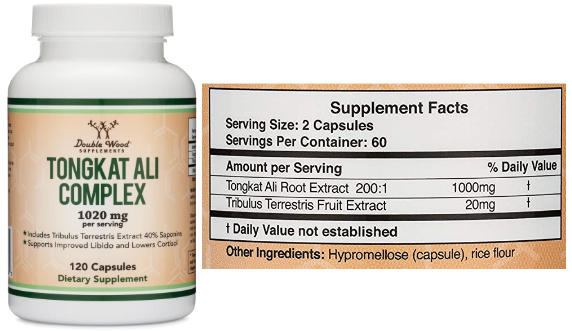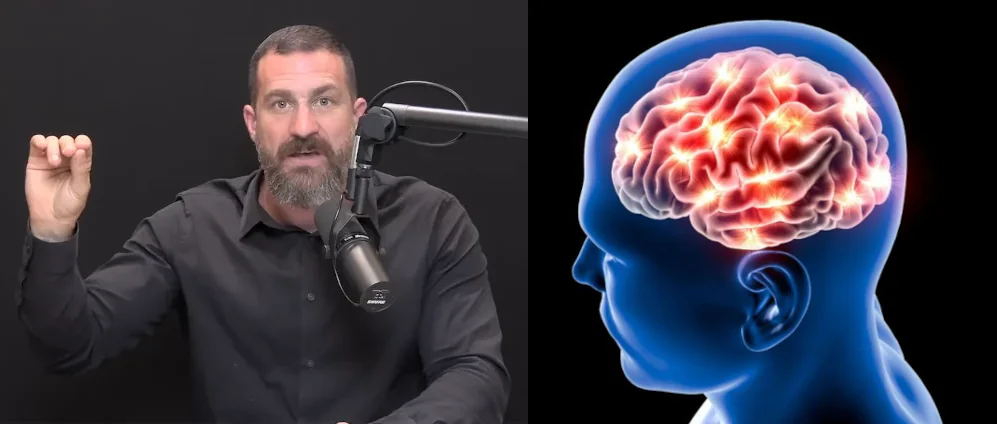Andrew Huberman discusses the following supplements in the context of boosting testosterone:
| Supplement | Dose / Notes |
|---|---|
| Tongkat Ali | 400 mg daily |
| Fadogia Agrestis | 400 – 600 mg daily, cycled |
| Zinc | Important for maintaining healthy testosterone levels |
| Boron | 2 – 4 mg per day |
Andrew says that 6 years ago, his total testosterone was at around 600.
After he started taking Tongkat Ali and Fadogia Agrestis, it went up approximately 200 points to the high 700s / low 800s (ng/dL).
He continued taking these supplements consistently for several years.
Below we look in more detail at doses, frequency and sources of these supplements.
^ Listen to the full podcast here – this section is ~2hr mark

^ Andrew teaching via his YouTube channel
Testosterone Supplements
Tongkat Ali
Tongkat Ali comes from a plant that’s native to Southeast Asia. There it’s treated as a medicinal plant and has many different uses1Tongkat Ali (Eurycoma longifolia Jack): A review on its ethnobotany and pharmacological importance – Karim et al. | Fitoterapia | 2010.
Andrew explains that Tongkat Ali will increase testosterone when taken at 400mg daily. He suggests:
- Taking it early in the day as it can have a mild stimulant effect.
- Taking it every day, rather than intermittently, as the effect appears to improve as you get into the second and third month of use.
- No need to cycle it, unless something has spiked on your blood tests – such as liver enzymes – suggesting the need to stop.
Examples of brands include:
- Momentous – Tongkat Ali – 400 mg per capsule (see 15% off discount code)
- Double Wood – Tongkat Ali Complex – 500 mg per capsule (see 15% off discount code)
- Double Wood – Tongkat Ali (LJ100) – 100 mg per capsule (standardized extract) see LJ100 vs Regular Tongkat Ali explainer post (use 15% off discount code)
Andrew’s Dose: 400mg per day

Fadogia Agrestis
Fadogia Agrestis is a plant found natively in Nigeria, for which the stem is used as a herbal medicine to treat a range of issues.
For the purposes of testosterone increase, Andrew describes Fadogia as increasing Luteinizing Hormone (LH), which then stimulates the testes to produce more testosterone.
In Andrew’s second interview with Dr Kyle Gillett (link), Andrew says he’s been taking 600 mg per day – for 8-12 weeks at a time, then cycling off for a few weeks.
Contrast this with Tongkat Ali, which he doesn’t cycle.
Andrew notes that he monitors his blood regularly, and hasn’t seen any negative impact from Fadogia on his blood markers.
In Andrew’s interview with Kyle Gillett (timestamp), Kyle notes a few approaches he takes when using Fadogia with patients to increase their testosterone.
For those who are not getting blood work done regularly, he suggests either:
- Taking 600 mg every other day
or
- Taking 600 mg 3 times per week, such as Monday, Wednesday, Friday
Then for those who are measuring their blood regularly, a more aggressive regimen can be:
- 600 mg daily for a month, and then take 1 – 2 weeks off
Kyle says that the caution in taking it daily, without any breaks, stems for a rat study that found on higher doses there was disruption to liver and kidney enzymes2Mode of cellular toxicity of aqueous extract of Fadogia agrestis (Schweinf. Ex Hiern) stem in male rat liver and kidney – Yakubu et al. | 2009 | Human & Experimental Toxicology.
He notes that this hasn’t yet been replicated in humans, but still leans on the side of caution.
Examples of reputable brands include:
- Double Wood – Fadogia Agrestis – 300 mg per capsule (see 15% off discount code)
Andrew’s Dose: 600 mg per day

Zinc
Andrew points to a 2020 paper3The causes of adverse changes of testosterone levels in men – Wrzosek et al. | 2020 | Expert Review of Endocrinology & Metabolism Journal showing that testosterone levels are negatively impacted by deficiencies in zinc, magnesium and vitamin D.
^ Clip source
We discuss magnesium for sleep (above), and vitamin D (below), so in this section we’ll focus on zinc.
Zinc is crucial to the creation of Luteinizing Hormone and Follicle Stimulating Hormone. Luteinizing Hormone in males stimulates the testes to produce testosterone. Meaning insufficient zinc can result in less testosterone.
Whilst the mechanism is slightly different in women, insufficient zinc will also negatively affect women’s testosterone levels4Effect of Zinc on Testosterone Levels and Sexual Function of Postmenopausal Women: A Randomized Controlled Trial – Nia et al. | 2021 | Journal of Sex & Marital Therapy.
Fun fact, whilst women have less testosterone than men, if you normalize their hormone values to the same units of measurement, they have more testosterone than all other hormones, including estrogen. Testosterone is the precursor to making estrogen (estradiol).
It’s worth noting that if you have adequate zinc levels, adding more zinc won’t boost your testosterone. Only that not getting enough is likely to decrease testosterone levels.

Dose: Andrew hasn’t mentioned the dose he takes. Although we do know the multivitamin he takes contains 15 mg of zinc.
NIH guidelines suggest males need 11 mg per day and women need 8 mg. With an upper limit guideline of around 40 mg for both sexes.
Zinc picolinate has been shown to be one of the most bioavailable forms of zinc5Comparative absorption of zinc picolinate, zinc citrate and zinc gluconate in humans | Barrie et al. | 1987 | Bioinorganic Interaction.
Brands of zinc include:
- Momentous – Zinc Picolinate – 15 mg per capsule
- Double Wood – Zinc Picolinate – 50 mg per capsule

Boron
Boron is a trace mineral found in small quantities in many of the foods we eat.
Andrew mentions taking 2 – 4 mg of Boron daily in his MPMD interview. See 3hr 9m or the clip below:
In Andrew’s interview with Dr. Kyle Gillett, Kyle suggested that Boron may help lower high SHBG, and thus increase the amount of free testosterone available. See 1hr 12m or the clip below:
Boron is not considered an essential micronutrient, so there is no Recommended Daily Allowance (RDA) figure for it.
However, the NIH site suggests an “acceptable safe range” of boron for adults is 1–13 mg/day.
Dose: Andrew takes 2 – 4 mg per day
Examples of brands selling Boron include:
- NOW – Boron – 3 mg per capsule
- Source Naturals – Boron – 3 mg (complexed with 3 forms)

Roundup
Whilst the above supplements can help with testosterone levels, Andrew does stress the importance of getting the “basics” right first. These are:
- Good quality sleep
- Healthy diet
- Regular exercise (but not over trained)
- Avoiding chronic stress
Once those boxes are ticked, adding supplements become more relevant.
Further Reading
If you found this post interesting, you may also like:
- Andrew Huberman’s Supplements – covering the different supplements Andrew has discussed on his podcast.
- Andrew Huberman’s Diet – What he eats and when – the formula that works for him.
- Andrew Huberman’s Book Recommendations – the top books Andrew has read, enjoyed and recommends.
References
- 1Tongkat Ali (Eurycoma longifolia Jack): A review on its ethnobotany and pharmacological importance – Karim et al. | Fitoterapia | 2010
- 2Mode of cellular toxicity of aqueous extract of Fadogia agrestis (Schweinf. Ex Hiern) stem in male rat liver and kidney – Yakubu et al. | 2009 | Human & Experimental Toxicology
- 3The causes of adverse changes of testosterone levels in men – Wrzosek et al. | 2020 | Expert Review of Endocrinology & Metabolism Journal
- 4Effect of Zinc on Testosterone Levels and Sexual Function of Postmenopausal Women: A Randomized Controlled Trial – Nia et al. | 2021 | Journal of Sex & Marital Therapy
- 5Comparative absorption of zinc picolinate, zinc citrate and zinc gluconate in humans | Barrie et al. | 1987 | Bioinorganic Interaction


